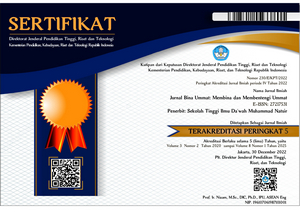MENTORING MODEL AINUL YAKIN THERAPY ISLAMIC BOARDING SCHOOL IN IMPLEMENTING ISLAMIC VALUES IN THE COMMUNITIES OF KARANGTENGAH, TEPUS, GUNUNGKIDUL
DOI:
https://doi.org/10.38214/jurnalbinaummatstidnatsir.v5i1.124Keywords:
Models, Mentoring, Islamic Boarding Schools, Instilling Islamic Values, SocietyAbstract
Research purposes:To find out how the mentoring model carried out by the Ainul Yakin Islamic boarding school in instilling Islamic values into the people of Krangtengah Hamlet, Tepus, Gunungkidul. Research Methods: Qualitative. The results of the study: The mentoring model carried out was categorized into four stages, namely First, Assistance by providing facilities to the community, in the form of providing a place, providing study materials through recitations held by the Islamic boarding school, activities for managing corpses and fostering ta'mir mosques. in Karangtengah Hamlet. Second, assistance through strengthening, namely by providing religious guidance to the community, involving the community to become employees of Islamic boarding schools, mutual cooperation and training. Third, assistance on the aspect of protection, Islamic boarding schools protect the community from the threat of the Plecit bank that ensnares residents. Fourth, the stage of support, implemented in the form of support for Islamic boarding schools in providing facilities and infrastructure for the community da'wah process.
Published
Issue
Section
This work is licensed under a Lisensi Creative Commons Atribusi 4.0 Internasional.
Authors who publish with this journal agree to the following terms:
- Authors retain copyright and grant the journal right of first publication with the work simultaneously licensed under a Creative Commons Attribution License that allows others to share the work with an acknowledgment of the work's authorship and initial publication in this journal.
- Authors are able to enter into separate, additional contractual arrangements for the non-exclusive distribution of the journal's published version of the work (e.g., post it to an institutional repository or publish it in a book), with an acknowledgment of its initial publication in this journal.
- Authors are permitted and encouraged to post their work online (e.g., in institutional repositories or on their website) prior to and during the submission process, as it can lead to productive exchanges, as well as earlier and greater citation of published work (See The Effect of Open Access).




